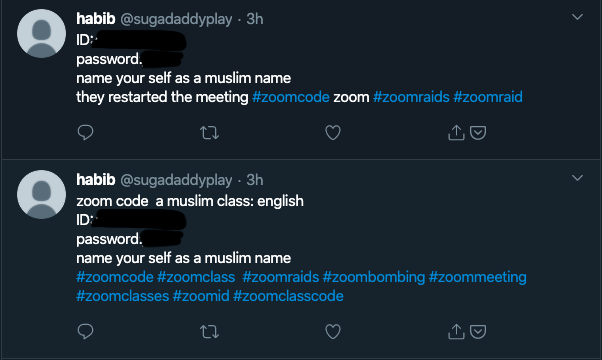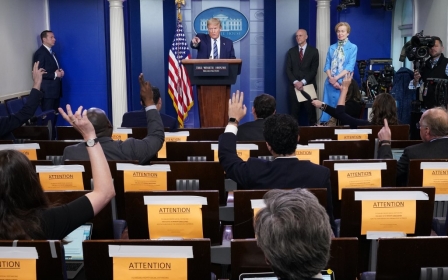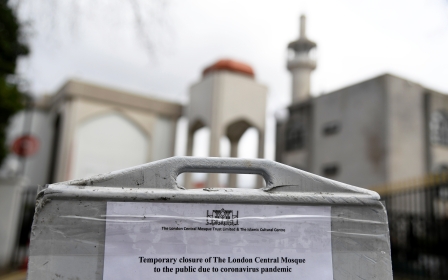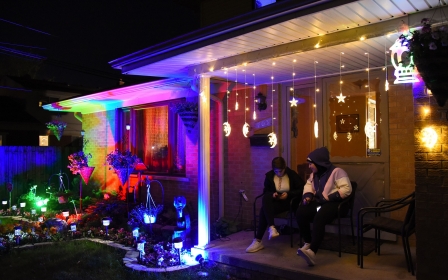As Muslims go digital amid pandemic, far-right groups are 'Zoombombing' faith-based meetings
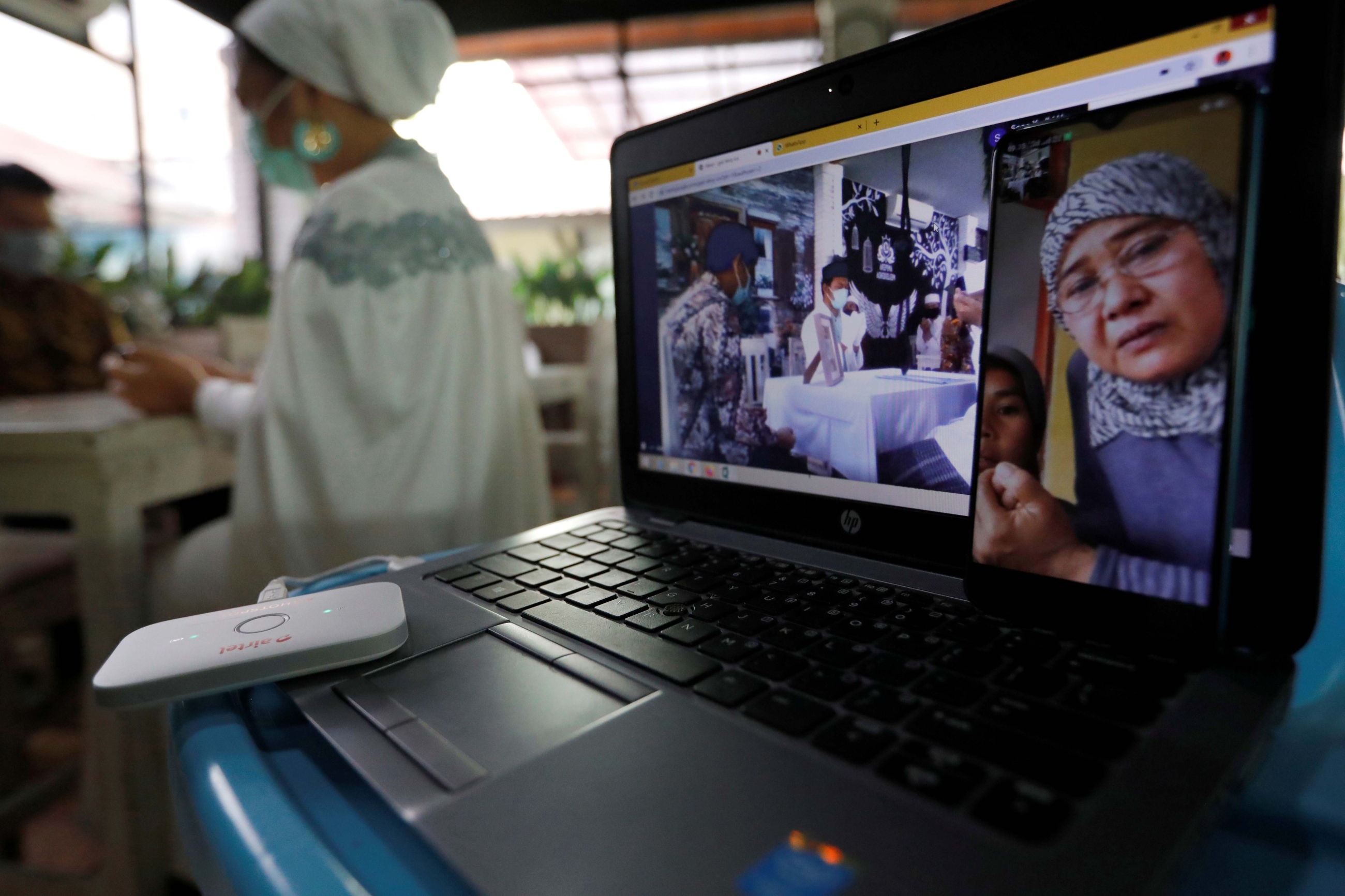
Saadia Ahmed was watching a webinar on mental and physical health when the troll attacked.
Twenty minutes into the discussion on Zoom, a video conferencing app, a muffled voice interrupted the speaker.
"I hate filthy coloureds," the man said as the presenter, unaware of what was going on, continued with the talk.
Shocked and distraught, Ahmed's hands began to shake as the gravity of what took place began to sink in.
"I was suddenly alert, alarmed. Were we just Zoombombed?" she said. "I shook my head in disbelief, telling myself that I was simply on edge because of our current climate around Covid-19 and the uptick in hate crimes."
New MEE newsletter: Jerusalem Dispatch
Sign up to get the latest insights and analysis on Israel-Palestine, alongside Turkey Unpacked and other MEE newsletters
But then the voice returned.
"F--- Muslims... I want you all to know that I hate you and I hope you all die."
In recent weeks, as schools, businesses, and places of worship have been forced to close as the nation endures its worst public-health crisis in a century, millions have turned to Zoom as a meeting platform.
However, several reports have emerged of online trolls "Zoombombing" meetings with obscene or hateful messages, or disrupting services with graphic videos, pornography and other content from across the internet.
While some of incidents may have been regarded as pranks or even trolling, they have since risen to the level of hate speech and harassment, and have even been investigated by the FBI.
'Raids have become a social activity'
With Muslims in America observing the holy month of Ramadan digitally - spending much of their day on various online gatherings, webinars, and virtual lectures - many fear a surge in online hate attacks from far-right trolls.
"We know an increase in online gatherings also comes with concerns about digital safety," said Madihha Ahussain, special counsel for anti-Muslim bigotry at Muslim Advocates.
Groups such as Muslim Advocates, a Washington-based rights organisation, have created guidelines for Muslims to follow to help prevent such attacks.
Still, the rapid adoption of Zoom as a platform for nearly all digital meetings has highlighted the glaring security holes in virtual gathering places.
The Shorenstein Center on Media, Politics and Public Policy has noted that Zoombombing is becoming an organised effort conducted through a multitude of online message boards, including 4chan and Discord.
"Coordinated raids on Zoom have become a social activity," Brian Friedberg, the senior researcher at the Shorenstein Center, said during a recent webinar on Zoombombing.
'Certain people are weaponising Zoom to sow division in society or spread hate'
- Zahed Amanullah, senior fellow at the Institute for Strategic Dialogue in London
While a portion of the individuals involved in these attacks are trolls and young students stuck at home with nothing to do, the Shorenstein Center says far-right groups are carrying out coordinated attacks on racial, ethnic, and religious minorities.
"We're talking about attacks on identity, particularly on marginalised communities," Friedberg said.
There also seems to be a similar pattern to these various attacks.
The attacks often begin with a racial epithet, then amid the confusion of the participants, the attackers deliver hate speech across audio and chat channels, finishing the raid by sharing pornographic content with the audience.
The New York Times reported the Concordia Forum, a global network of Muslim leaders based out of London, was hijacked with racial slurs and pornographic material during an online meeting to discuss spirituality and maintaining wellness in March.
"Certain people are weaponising Zoom to sow division in society or spread hate," Zahed Amanullah, a senior fellow at the Institute for Strategic Dialogue in London, told the Times.
"Those of us who are of particular backgrounds and who are targets of hate bear the brunt of it."
'Wolves coming at me from all directions'
On 30 March, Soumaya Khalifa, who was hosting a webinar on mindfulness, was confronted with 20 Zoombombers who flooded in prior to the start of the meeting. Alone, Khalifa was taunted, told to take off her hijab and bombarded with pornographic imagery.
"It was overwhelming. I was traumatised and physically shaking," Khalifa told the Huffington Post. "It was like wolves coming at me from all directions. You get rid of one and 10 more pop up."
Days later, after taking extra precautions during other sessions, these interrupters continued to make their way through, in one incident making fun of Muslims abstaining from eating pork, and in another a Black imam was called by the "N-word".
Two Muslim Student Associations (MSAs) - Central Washington University and Princeton University - were also attacked online.
During an online Friday prayer service on 17 April, Princeton MSA president Fawaz Ahmad recognised racial epithets being chanted by some of the participants.
Ahmad noticed that the Zoombombers also played a song featured in anti-Muslim memes about the Islamic State (IS) group.
As he muted them, they switched to the online chat feature. When Ahmad turned the chat off, they began showing pornographic content on their screens.
"I was so disturbed myself," he told the Daily Princetonian. "I didn't want anybody else to have to see what I had seen."
"It wasn't just generic evil swearing or whatever at people. There were pointed disgusting things about God or about Islam," he said.
"Just thinking that there's people that are so disturbed to actually be propelled to do stuff like this in the first place was just ... a wake-up call."
'Hope for the best, prepare for the worst'
On 1 April, the FBI reported that it had reviewed more than 1,200 cases of Covid-19-related online scams, and said that the groups conducting the schemes would continue to target people at home through vulnerabilities in their software and online platforms.
The guideline created by Muslim Advocates, emphasised that event organisers need to follow a few steps in order to heighten their security.
These steps include creating a meeting password and a unique event link, as well as assigning a co-host to be able to monitor participants' activity while the other host is speaking.
The Shorenstein Center also delivered a few suggestions, including centralising the meeting controls on Zoom, so that only the host can mute or unmute participants, as well as turn on or turn off video.
Still, Ahussain noted that despite taking all these measures, there is a risk that a meeting could be interrupted and attacked.
"Prepare for the possibility of disruptions," she said. "Hope for the best and prepare for the worst."
Middle East Eye delivers independent and unrivalled coverage and analysis of the Middle East, North Africa and beyond. To learn more about republishing this content and the associated fees, please fill out this form. More about MEE can be found here.


